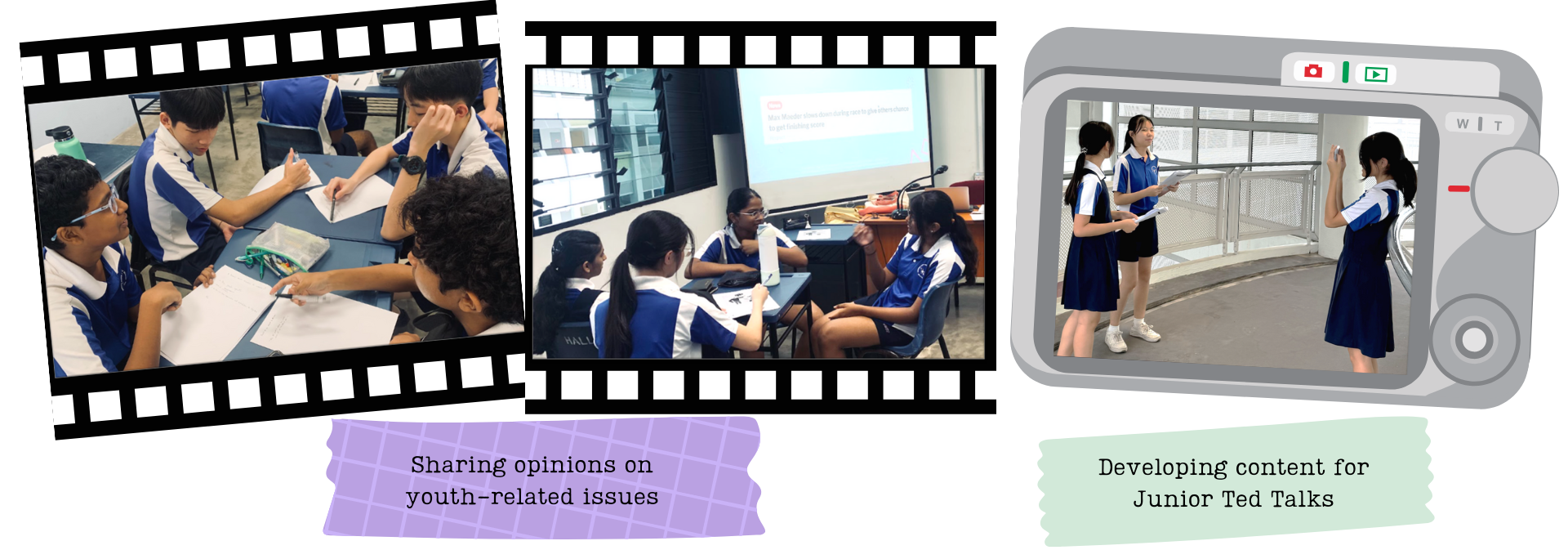English Language and Literature
English Language and Literature
Teaching Staff
|
01/ |
Ms Chin Siang Yee, Samantha
|
02/ |
Ms Junaidah
|
03/ |
Ms Tay Shi Ying
|
|
04/
|
Ms Sandramathy d/o Idamban
|
05/ |
Ms Ng Ling Yee Domina
|
06/ |
Ms Fong Sum Yi
|
|
07/ |
Ms Darshini D/O Gunaseigaran
|
08/ |
Mr
|
09/ |
Ms Anne Roseline
|
|
10/ |
Ms Sharon Tan
|
11/ |
Ms Shannen Lim
|
||
English Language
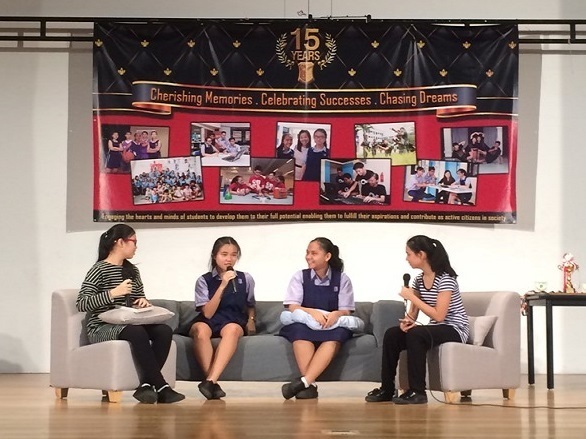
Subject Offered
-
English Language
Curriculum
Our English Language Syllabus, in alignment with the MOE English Language Syllabus 2020 for Secondary, builds on the progression of language skills, learner strategies and knowledge about language as set out in the MOE English Language Syllabus 2020 for the Primary level.
The overarching aim of the EL Syllabus 2020 is to develop effective and affective language use in students in the following areas:
1. Listen to, read and view critically and with accuracy, understanding and appreciation a wide array of literary and informational texts in standard English from print, non-print and digital networked sources.
2. Speak, write and represent in standard English that is grammatical, fluent, intelligible and appropriate for different purposes, audiences, contexts and cultures.
3. Use standard English grammar and vocabulary accurately and appropriately, and understand how speakers/writers put words together and use language to communicate meaning and achieve impact.
4. Use English with impact, effect and affect.
The syllabus aims to advance students’ language learning and develop students into Empathetic Communicators, Discerning Readers and Creative Inquirers.
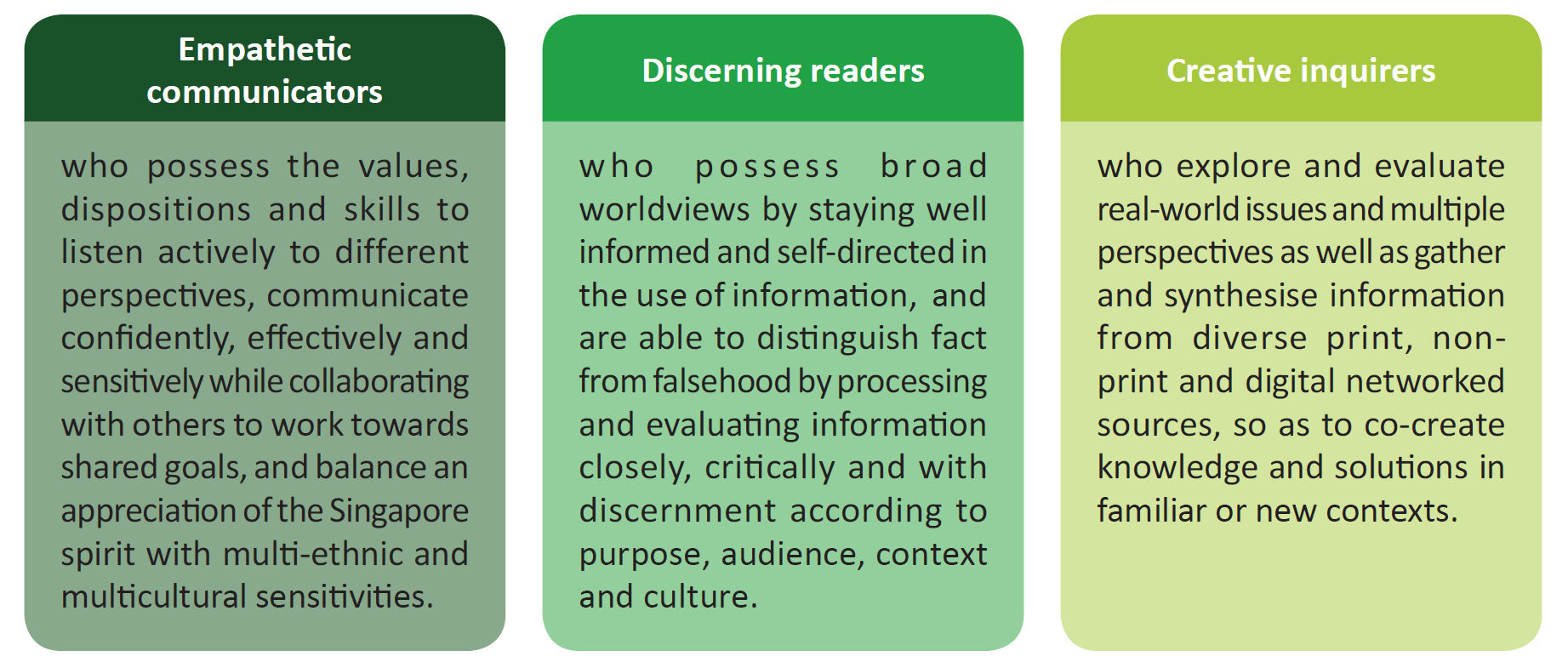
English Language Lessons at JWSS
The lessons focus on the enjoyment of language as students learn, integrate and apply knowledge across areas of language learning.
To foster self-directed learning, opportunities are provided for students to apply metacognitive strategies through review and reflection. Other than teacher and/or peer conference, students are guided to notice, monitor and regulate how they are learning, and to reflect on the extent of their learning or improvement through the use of rubrics, checklists and reflection activities.
To encourage higher-order thinking, opportunities are provided for students to progressively read, view and respond to age-/ year-appropriate texts (print, non-print and digital networked sources) of increasing complexity and create a range of texts, including multimodal and hybrid texts, for various purposes.
Literature in English
Subjects Offered
-
Literature in English (Lower Sec)
-
Humanities Literature in English (Upper Sec Express)
-
Pure Literature in English (Upper Sec Express)
Curriculum
|
The aims of the Literature in English syllabus are to enable students to:
|
|
Literature in English Lessons at JWSS The study of Literature centres on literary response – the negotiation of meaning between readers and texts. This Literary Response Framework represents how teachers will design learning experiences that encourage students to respond to texts in a holistic manner. 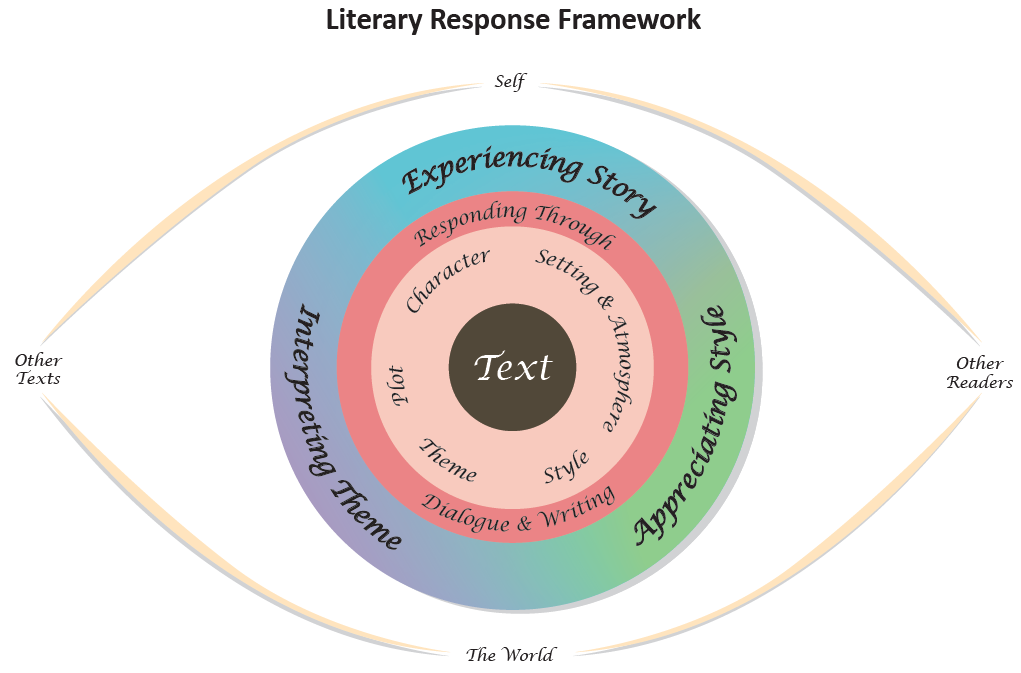
The lessons focus on the empowerment of students as they engage in active meaning-making of the text with discernment. Through lessons, students develop an appreciation of language as they learn about the five areas of study – plot, character, setting and atmosphere, style and theme. To foster effective communication skills, students share their understandings of a text through a variety of ways, including through discussions and written tasks. They will be guided to shape their thoughts into arguments who are supported with elaboration and textual details. |
English Language and Literature Programme
Achievements
Each year, the English Language Department provides opportunities and platforms for students who demonstrate a passion for and talent in English Language and the literary arts. Teachers in the department invite these students to participate in competitions and seminars at the cluster, national, and international levels.
Below are some of our students' achievements over the past three years.
|
Competition |
Achievement |
Year |
|---|---|---|
|
ICAS English |
High Distinction (Top 1% in Singapore): Goh Wei Zeng (4RT) Distinction (Top 10% in Singapore): Toh Rui Xuan (2EE), Anburaj Valentina (3IN), Feba Jibin (4RE) |
2024 |
|
ICAS Writing |
High Distinction (Top 1% in Singapore): Nur Adriana Binte Sha’ari (4PN) Distinction (Top 10% in Singapore): Wai En Qi (2PN), Khoo Yee Jye (3IN), Simone Tan (3RT), Chelsea Chan Yu Qi (4PN), Xacus See Tho (4RT) |
2024 |
|
The Queen’s Commonwealth Essay Competition |
Gold Award: Ong Yong Jun Nathaniel (1IN), Chu Yun Le (1HY), Afreen Faezah (3CE), Anburaj Valentina (3IN), Htet Thiri (4RT) Silver Award: Gan Yao Kai (1CE), Lim Ying Jia (1IY), Simone Tan Ann Qi (3RT), Valerie Tay (4IY) Bronze Award: Averen Wong Kai Feng (1EE), Ng Hon Cheng Elroy (1HY), Noelle Ke Hui Heng (1RT), Matilda Cheong Ya Lee (2IY), Lim Yong Qing (3CE), Marsha Dylara Binte Mohammad Marruwe (3RT), Jek En Ning Zennicia (3RT), Thamirra Raghunathan (4IY), Goh Wei Zeng (4RT) |
2024 |
|
Unity Writer’s Festival (UWF) |
Poetry Competition, First Place: Noble Thet Mon (2RE) |
2024 |
|
National Poetry Competition |
Super Junior Category, Merit Award (Top 10): Jothiraj Kaavyashri (2RE) |
2024 |
|
ICAS English |
High Distinction (Top 1% in Singapore): Anburaj Valentina ( 2RT) Distinction (Top 10% in Singapore): Chang Zheng Han (2RE), Teo Tze Feng Jafon (2RT), Simone Tan Ann Qi (2EE), Choi Yuk (3CE), Shahina Nabiha d/o Mohamed Sulaiman (3CE) |
2023 |
|
ICAS Writing |
High Distinction (Top 1% in Singapore): Anburaj Valentina (2RT), Putri Aleeya Binte Mohamed Rizal (2PN), Ang Hui Yi (3CE) Distinction (Top 10% in Singapore): Afreen Faezah Binte Mohamed Ali (2IY),Simone Tan Ann Qi (2EE) |
2023 |
|
The Queen’s Commonwealth Essay Competition |
Gold Finalist Award: Chow Zhenyu (4N3) Gold Award: Francesma Emanuelle Esguerra Castillo (2PN), Jek En Ning Zennicia (2EE), Huda Inaiyah Binte Mohamed Nizzan (4E3) Silver Award: Anburaj Valentina (2RT), Kwa Yi Da (2RE), Htet Thiri (3RT), Niang Sian Huai (4E1), Ernest Teo Zhi Yao (4E3) Bronze Award: Tan Kai Wen (1RT), Simone Tan Ann Qi (2EE), Nidhi Somashekar (2IY), Afreen Faezah Binte Mohamed Ali (2IY), Balakrishnan Haripriya (2IY), Putri Aleeya Binte Mohamed Rizal (2PN), Anne Lohita (2RT), Chang Zheng Han (2RE), Nuryn Hanisah Binte Muhammad Izwan (2RE), Shahina Nabiha d/o Mohamed Sulaiman (3CE), Sia Hui Xian Chloe (3IY), New Wu Chiu (4E1), Tia Git Yu (4E3), Nur Syifa (4N1), Ma Yuxin Cynthia (4N2) |
2023 |
|
Voices of the West |
Distinction Award: Trisha Aliyah Ang Naidu (2IN) |
2023 |
|
Creative Arts Programme |
Participated in the Creative Arts Seminar organised by Gifted Education Branch, Ministry of Education Singapore and Yale-NUS College: Nidhi Somashekar (2IY), Anburaj Valentina (2RT) |
2023 |
|
ICAS English |
High Distinction (Top 1% in Singapore): Shahina Nabiha D/O Mohamed Sulaiman (2CE) Distinction (Top 10% in Singapore): Lim Xuan Xian, Zoya (3E4), Ang Hui Yi (2CE), Chelsea Chan Yu Qi (2PN), Francesma Emanuelle Esguerra Castillo (1PN), Putri Aleeya Binte Mohamed Rizal (1PN), Nidhi Somashekar (1IY), Bruzo Nathaniel Clyde Biglaen (1RT), Anburaj Valentina (1RT) |
2022 |
|
ICAS Writing |
High Distinction (Top 1% in Singapore): Xania Chen (4E1), Gisele Low Xin Hui (4E4), Ang Hui Yi (2CE), Nidhi Somashekar (1IY) Distinction (Top 10% in Singapore): Htet Thiri (2RT), Chua Le Yu (3E1), Lim Xuan Xian, Zoya (3E4) |
2022 |
|
The Queen’s Commonwealth Essay Competition |
Gold Award: Claire Lim Yee Xuen (1RE) Silver Award: Isaac Sim Cheng Jun (4E2), Tan Kai Ting, Kes (3E4), Lim Xuan Xian, Zoya (3E4), Nethra Viswanathan (2CY), Nur Zahirah Binte Jerryrudin (2CE), Shahina Nabiha D/O Mohamed Sulaiman (2CE), Claris Toh Rui Xi (2RT), Feba Jibin (2RE), Simone Tan Ann Qi (1EE), Nidhi Somashekar (1IY), Putri Aleeya Binte Mohamed Rizal (1PN), Afreen Faezah Binte Mohamed Ali (1IY), Chang Zheng Han (1RE) Bronze Award: Wong Wei Ren Aviv (3E1), Ng Ai Khee (3E4), Goh Wei Zeng (2RT), Nur Hishmah Binte Kalilur Rahuman (2CY), Naomi Lam Hyun Yee (2IN), Kaeden Zou Yankai (1IY), Enya Hoo (1CE), Marsha Dylara Binte Mohammad Marruwe (1RE) |
2022 |
READ! Fest
The annual Read!Fest is organised in conjunction with the National Reading Movement. A myriad of engaging activities were held to celebrate the joy of reading and encourage reading widely in the week-long event.
Donning the guise of beloved characters from fantasy realms, our EL teachers heralded the JWSS Read! Fest 2024.
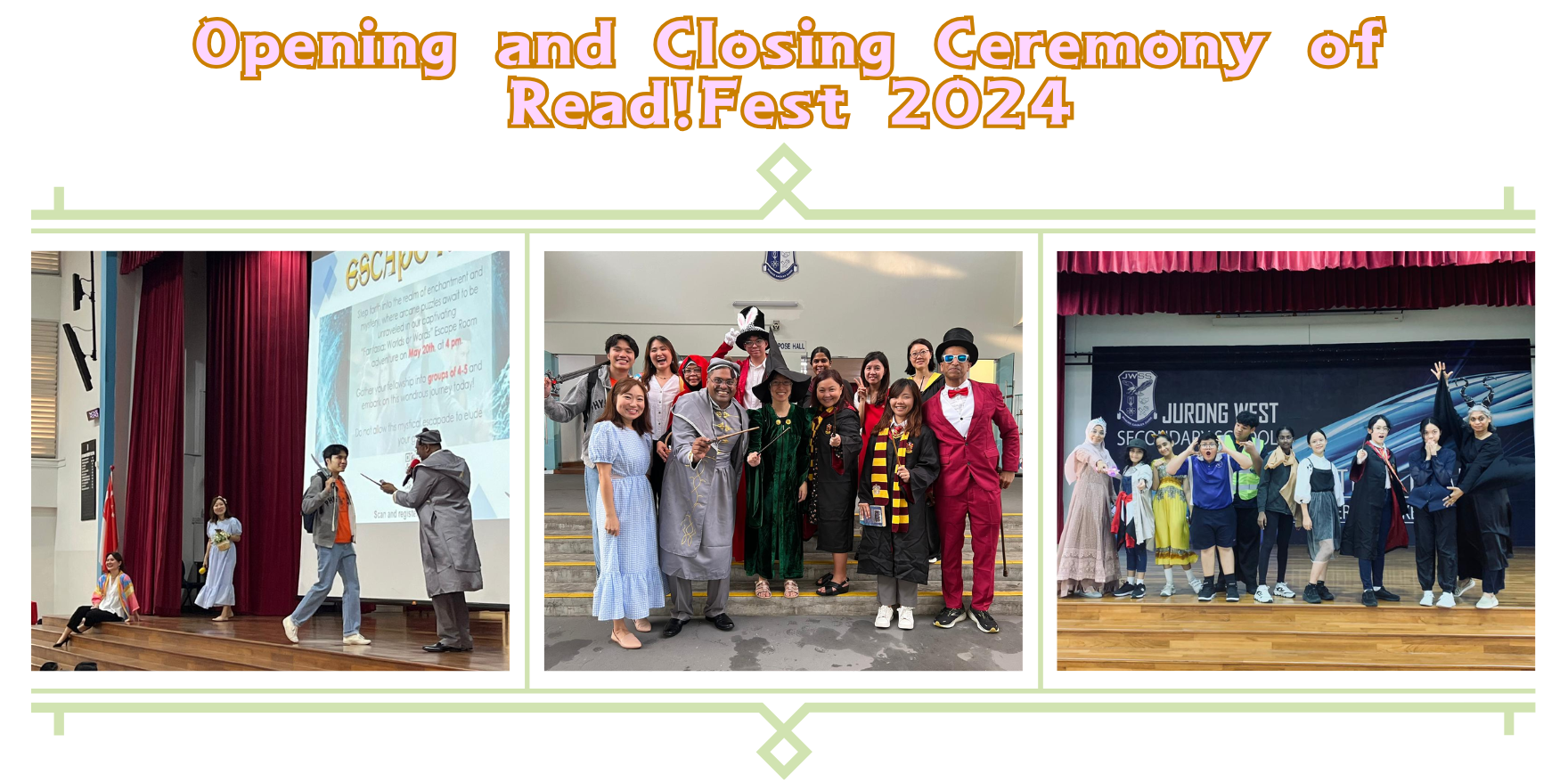
Donning the guise of beloved characters from fantasy realms, our EL teachers heralded the JWSS Read! Fest 2024. The week ended with a video compilation of Read! Fest 2024 activities, Book Parade presentations and a magical finale on the joy of reading by the ELDD members.
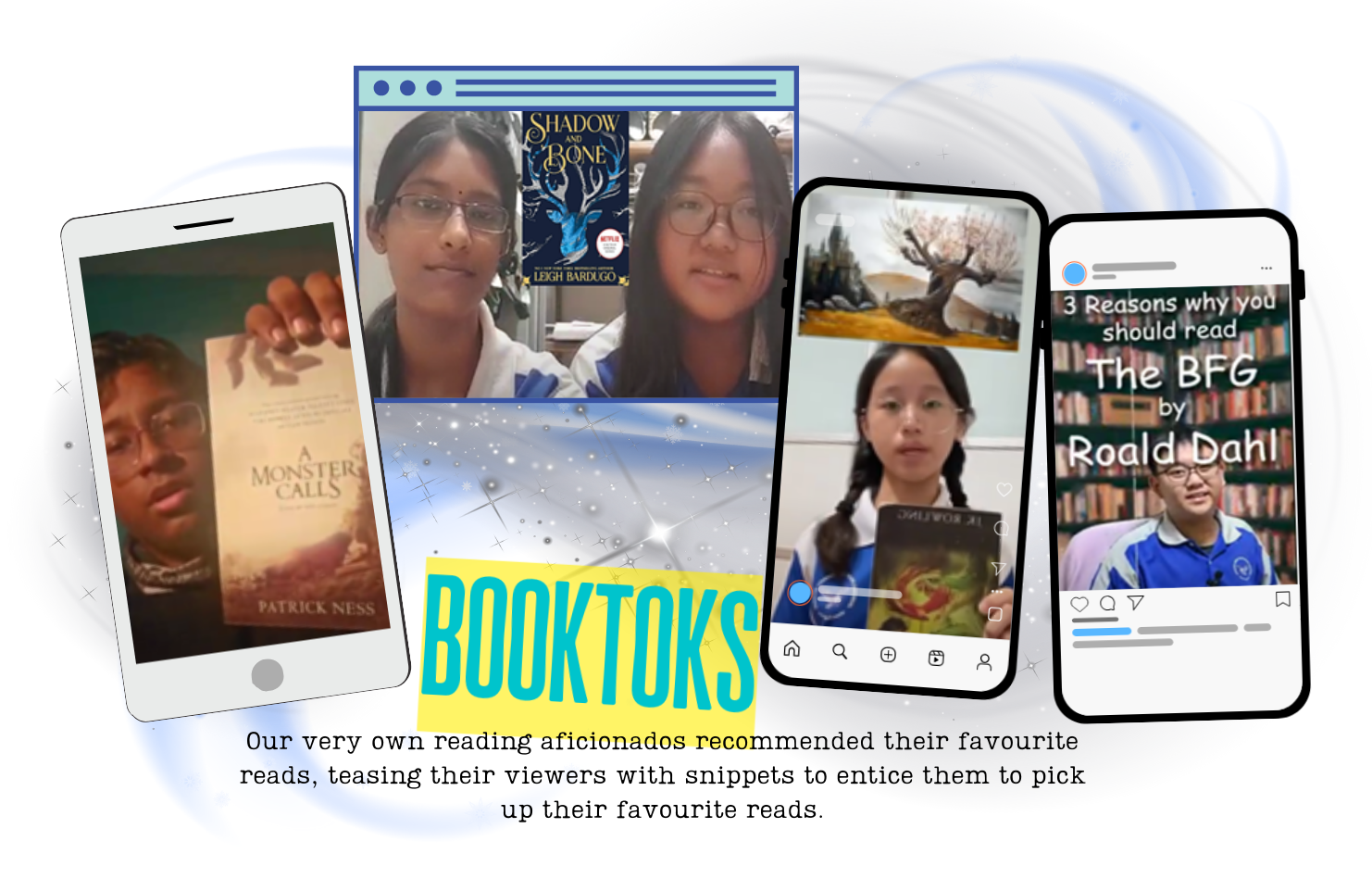
Favourite reads were gifted by teachers across departments, and hunts in the school commenced with much excitement.

During their CCE lessons, students from each level participated in activities designed to spark creativity and foster collaboration.
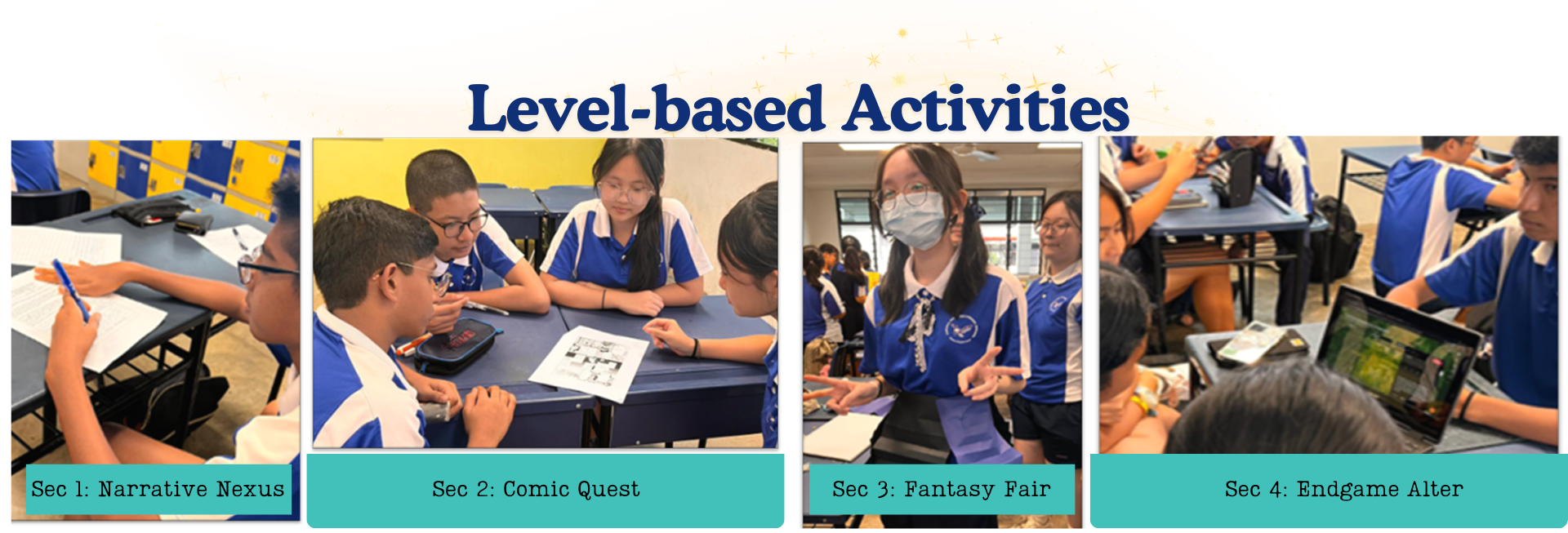
Adding to the excitement of Read! Fest 2024, seven teams raced against time in iconic destinations through our exhilarating ELDD-initiated Escape Room. This extraordinary adventure was organised for the second time in Read! Fest, making it an unforgettable experience for everyone involved.
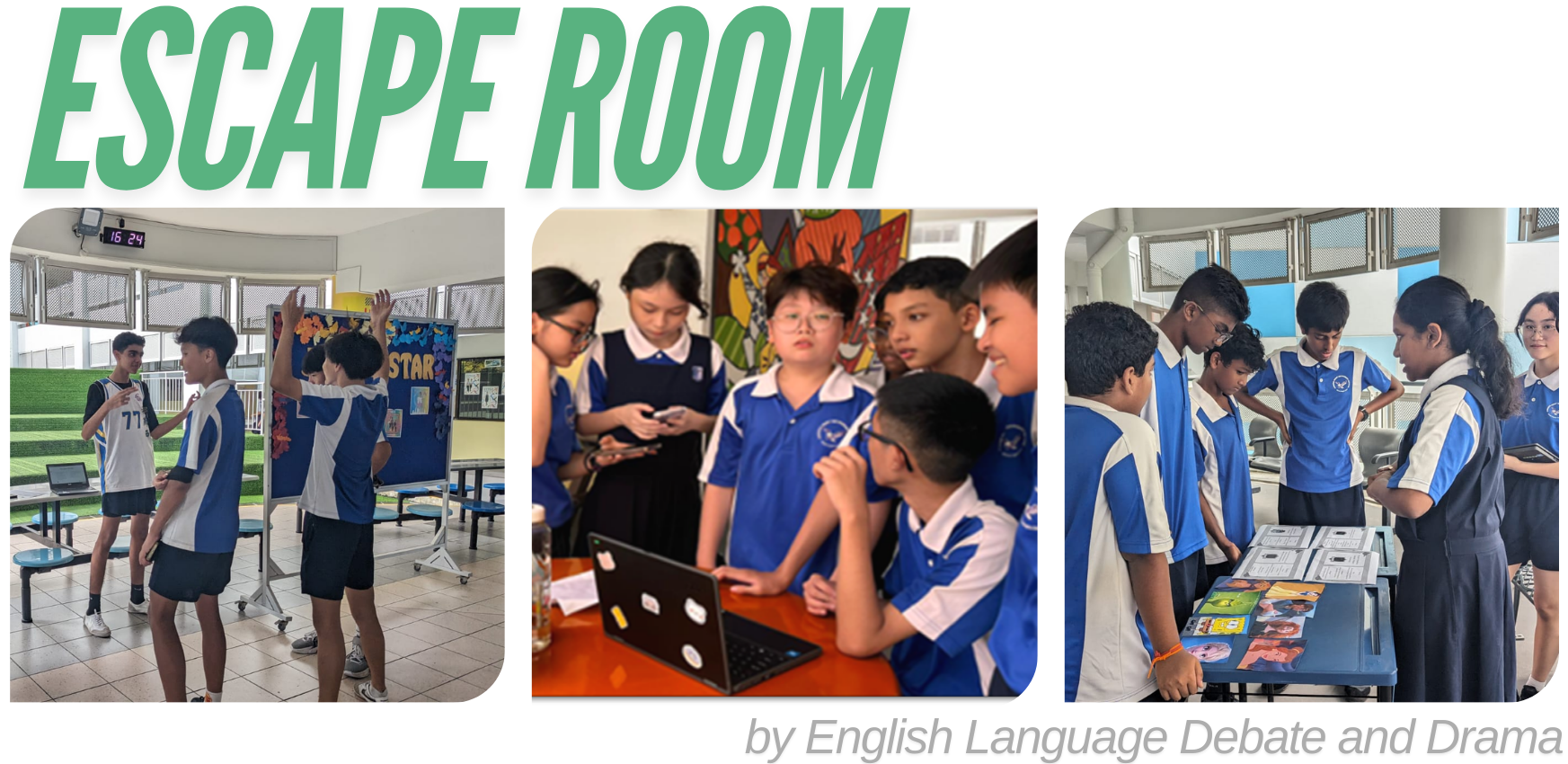
To foster students’ enthusiasm for learning, students were able to enjoy reading a wide array of riveting Singaporean fiction and non-fiction excerpts using the Sing Lit Cloud Machine. Our Instagram page is designed to encourage students to read beyond the classroom.
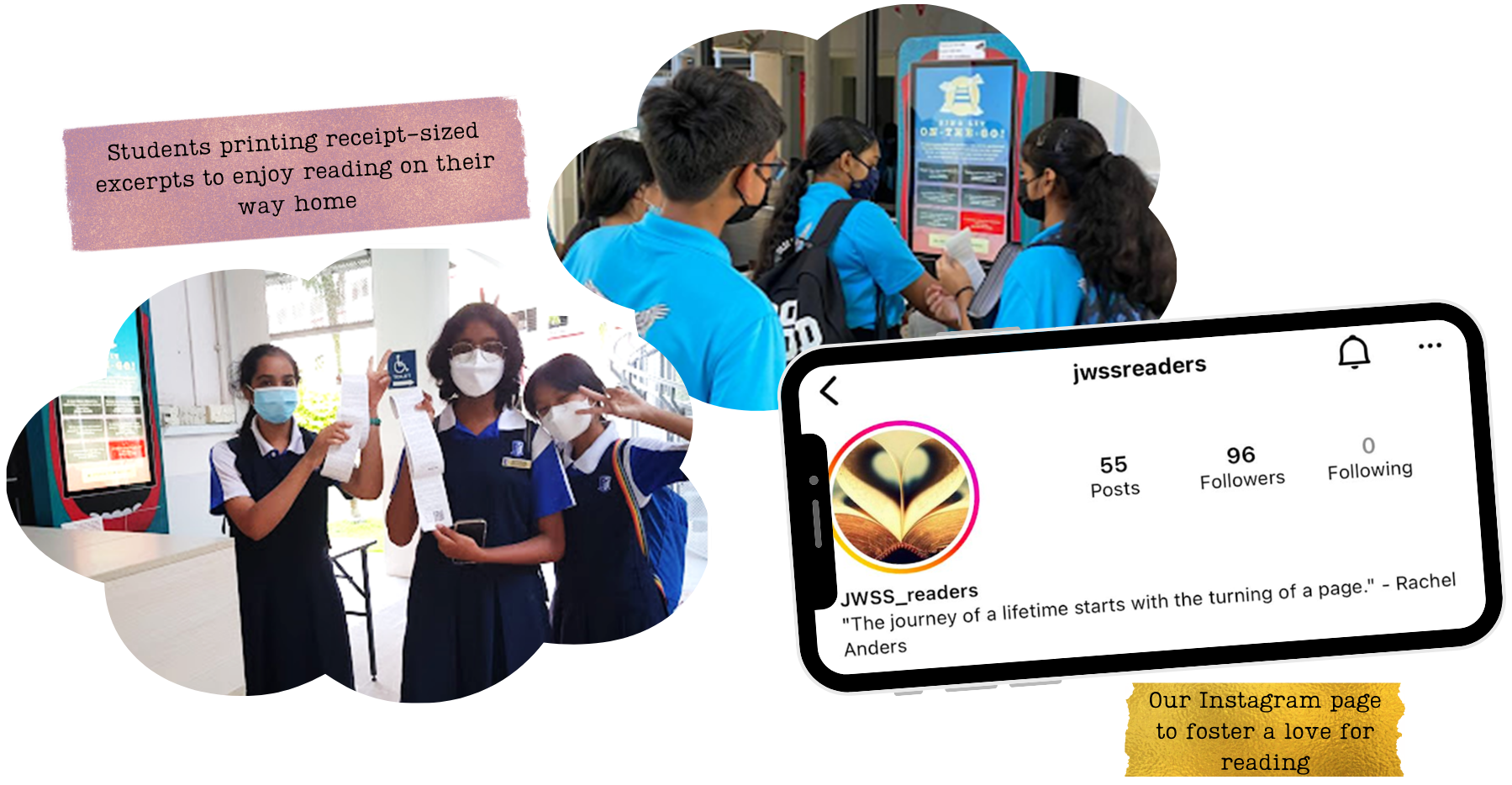
W3 Literature Symposium 2024
The 9th JWSS Literature Symposium was successfully conducted by the JWSS Literature Unit on 17th May 2024. It was well-received by over 150 student and teacher participants from 8 different secondary schools.
This year’s theme is ‘FANTASIA: Worlds of Words’. The symposium aimed to cultivate a deeper appreciation for Literature by showcasing how words transport us to diverse realms and foster boundless imagination. The event was graced by esteemed guests, senior teachers and experienced lecturers from NIE who conducted workshops and presentations for students to interact and collaborate, thus increasing their confidence and passion in Literature. Greater collaboration was also fostered among the Literature teachers through the teachers’ workshop which touched on effective teaching pedagogies and resources for Literature.
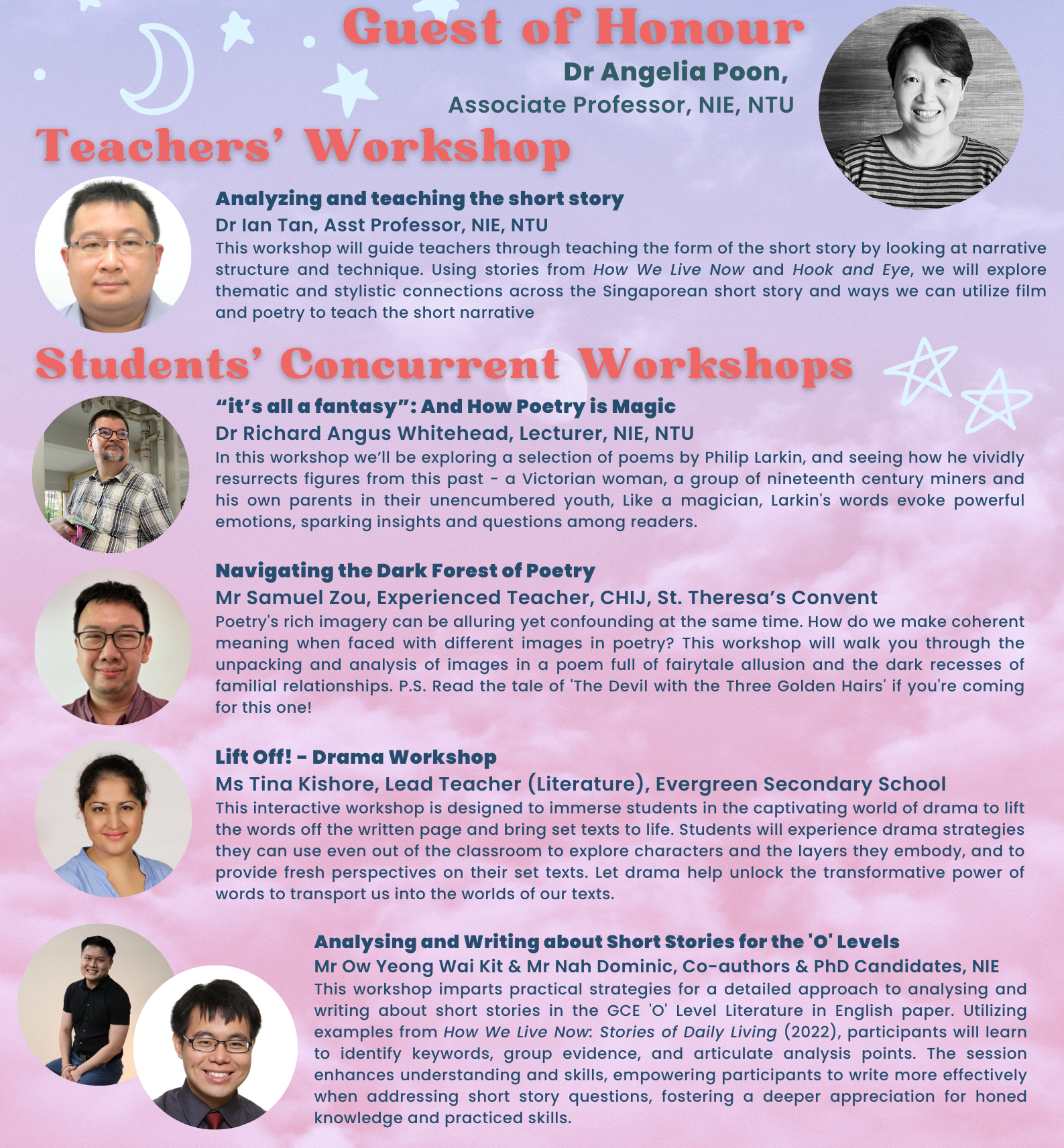
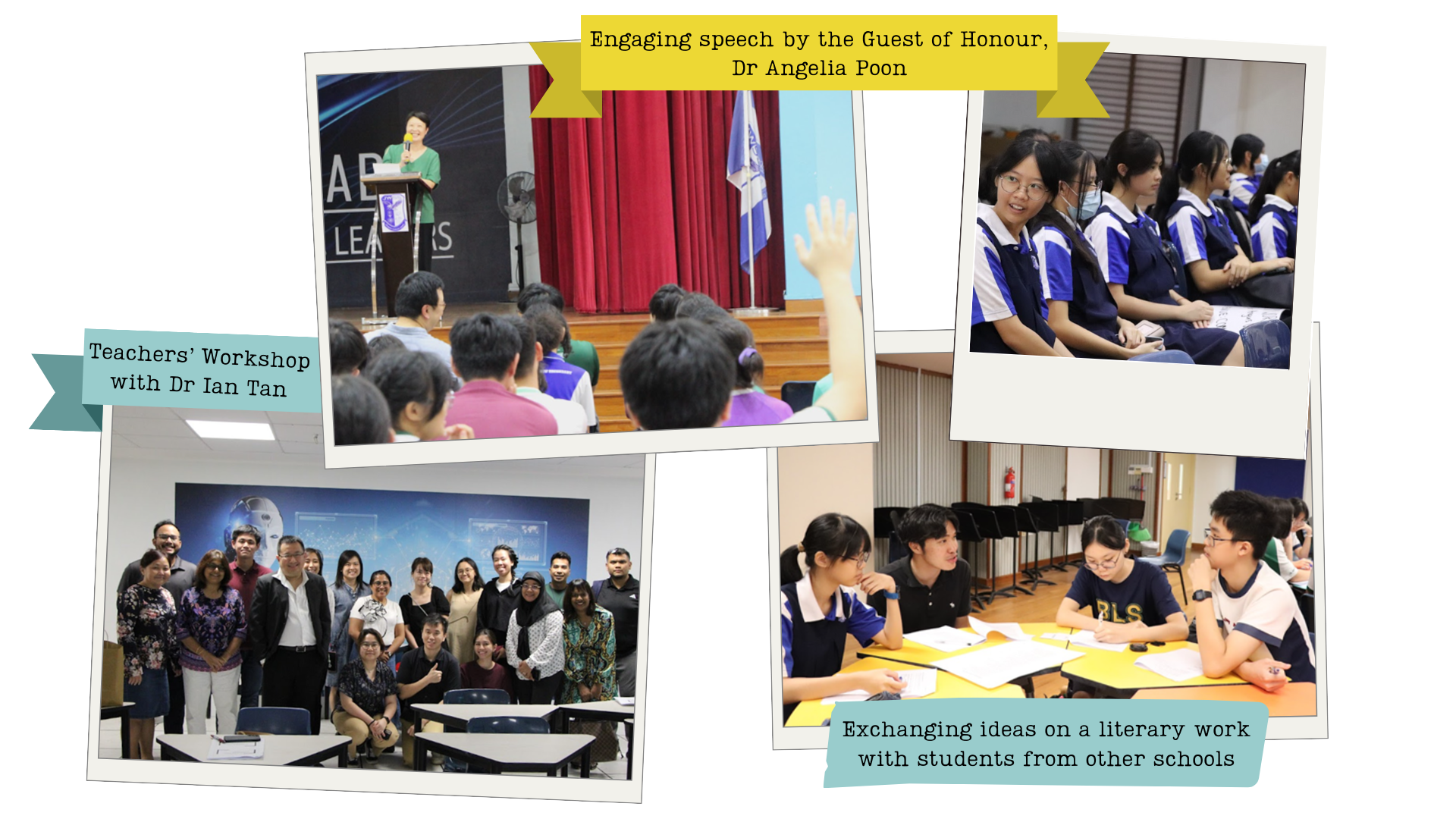
Speak Up, Speak Out Workshop
As part of the exciting line-up of LIFE@JW activities, the Secondary Three students had an enjoyable time honing their skills of rhetoric and argumentation.
